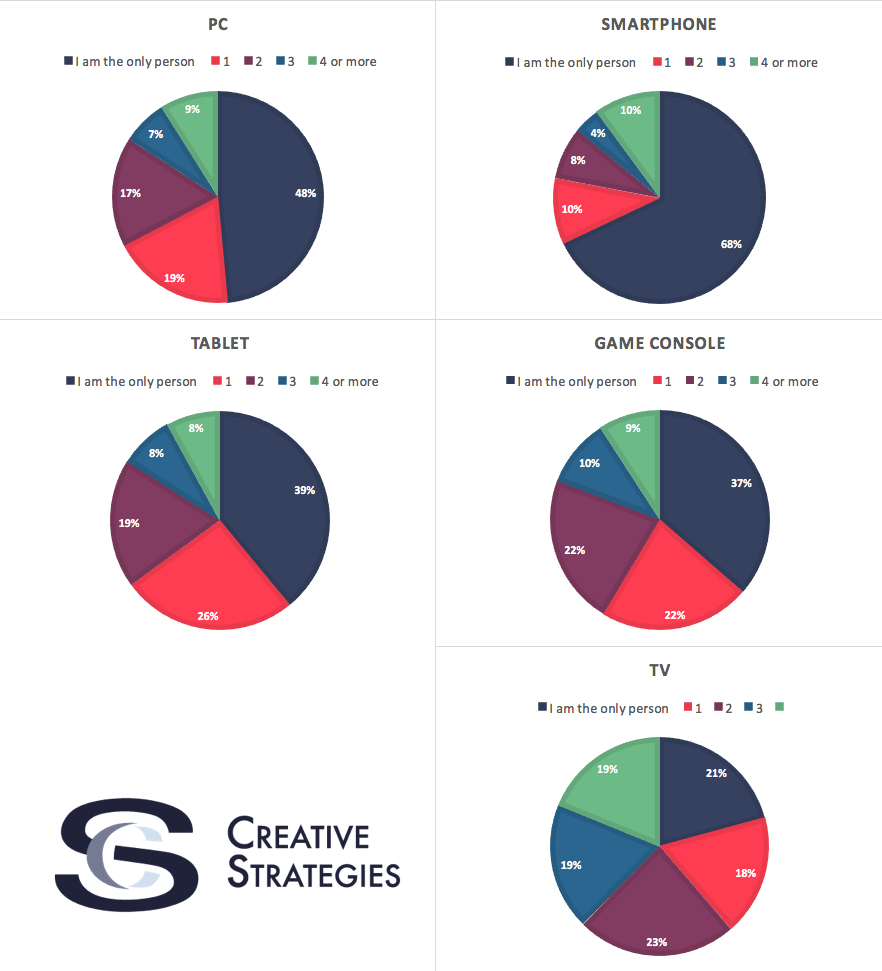The tablet category remains a central part of our analysis amidst the personal computing hardware landscape. I’ve been bullish on this form factor, despite the market issues, and still believe it represents the most approachable and easy to use larger screen computer on the market. We have been digging into consumer behavior around the tablet category for several years and the one trend that always stood out to me was how the tablet was more of a social device than a personal one for a good chunk of the market. I charted specific devices and what percent of consumers indicate if the product is shared or not.
I’ve intentionally grouped these devices in their order. From upper left to lower right, the ranking of shared vs. personal is displayed. The smartphone is the least shared and most personal device consumers own. The PC is not far behind. When we look at the tablet, we see it is closer to less personal and less individually owned consumer electronics. I picked both game consoles and TVs as a comparison as they are both much more communal devices in the home.
I sense this observation has a role to play in how consumers view their tablets and their ownership of it and is one of a few reasons I believe most consumers have yet to replace their tablet as frequently as their phone and have not considered replacing their PC/Mac with a tablet. It all comes down to how the device is used and viewed by its owner. If the product is not used that much individually, but perhaps more so socially, then the burden to have the latest and greatest is not high. The main point here is devices which are viewed as more personal, and arguably more essential, will be viewed differently than ones considered less essential.
Perhaps nowhere is that more clear than when we asked consumers to rank their most personal device. In several different phrasings of the question, in every result, the tablet ranked the lowest in device importance and most personal device. That, I believe, is very telling about how it is viewed by the mainstream and a key reason why the market is struggling as it is.
Note how big the tablet market could have been if no one shared it and it was more like the smartphone as a primarily personal device. This sharing dynamic has certainly made it so not everyone in the household needs one, even if they all want one. Perhaps down the road this is a good thing and may help spur more individual ownership. Time will tell.
Lastly, it should come as no surprise that tablet sharing ranked highest among parents and age groups between 24-44. Tablet sharing was the lowest among the 55+ demographic. A group which also ranked tablets much higher as the most personal and important computer they own.
Similarly, countries which have much larger households filled with many families living together and a strong cross-generational mix also ranked quite high with tablet sharing. Notably, the Latin America region and Asia Pacific.
There is a clear pattern here with regard to tablets but the narrative is likely to start to change over the next few years. At least, the story needs to if companies with a vested interested in this category hope to inject some needed life into it.


The jobs of personal tech are either communication, entertainment or productivity. The sharing dynamic is probably a result of tablet usage predominantly being in entertainment.
I expect that tablets will not be able to expand much in communications, simply because we have smartphones which are much better for the job. However productivity, including children using tablets for their assignments, could shift usage to being more personal.
I’m sure that Apple has many more projects like the IBM & SAP collaboration underway. I see these as being the true (albeit boring) drivers of tablet growth.
Agree, on the last two sentences. Outside of enterprise / higher education, the smartphone is THE and most of the time the only “computer” of choice or need.
I tend to agree but as I point out the entertainment angle today is the one cemented in consumer minds. This needs to change somehow for the tablet to start to eat more into productivity. My gut is the cloud plays a key role in this..
As you describe, one way is to change consumer mentality so they accept it as a productivity device. The other is to get corporations or educational institutions to use tablets, and subsequently influence consumers.
I see a gradual but steady adoption of tablets in both enterprise and education, even without direct involvement of IBM and SAP. Given Apple’s focus in these areas, it will likely accelerate. Cloud (maybe private Cloud) will be important as you mention, because tablets rely on this. I have no idea of the timing, but it seems inevitable that tablets will eventually be productivity devices, and that they will become more personal as a result.
I think we’ll run into an issue with the definition of tablet. MS have regular PCs in the form of tablets, Surface’s (and its ilk) high end is more powerful than your average Mac or PC, desktop or laptop. Does that count as a tablet ? A desktop ? A laptop ?
There is definately a lot to find out about this subject. I like all the points you made